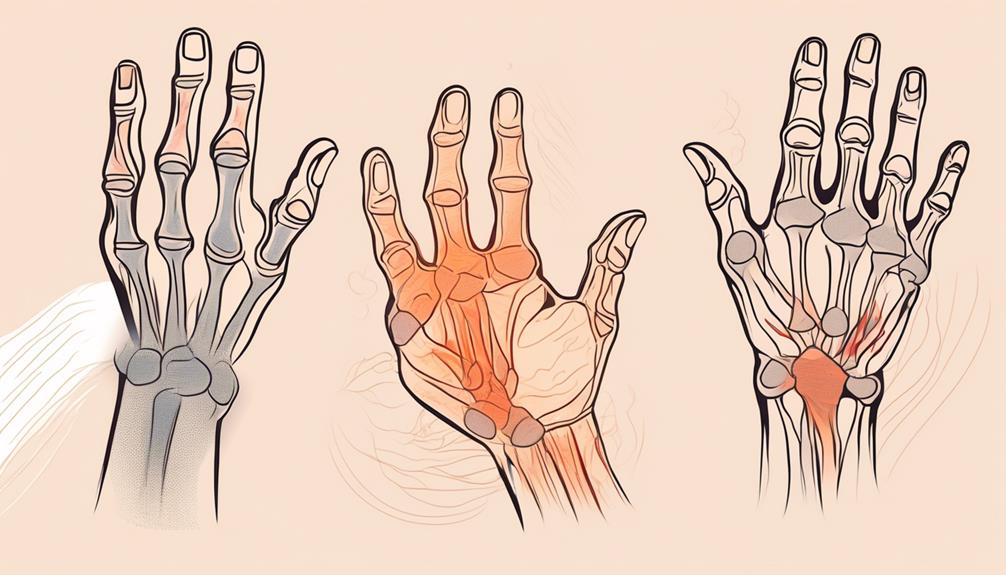7 Key Facts About Rheumatoid Arthritis
As you navigate the complex landscape of rheumatoid arthritis, it’s crucial to understand the key facts surrounding this chronic autoimmune disease.
With joint inflammation acting as the spark that ignites a cascade of symptoms, including chronic pain and stiffness, it’s essential to grasp the intricacies of this condition.
But did you know that seven pivotal facts could significantly impact your understanding and management of rheumatoid arthritis?
From the underlying mechanisms of this autoimmune disorder to the latest treatment strategies, these facts hold the potential to empower and guide your journey towards better health and well-being.
Key Takeaways
- Rheumatoid arthritis is a chronic autoimmune disease that primarily affects the joints.
- Early diagnosis and treatment are crucial in managing rheumatoid arthritis and preventing long-term joint damage.
- Rheumatoid arthritis is characterized by inflammation, pain, stiffness, and joint deformity.
- Genetic and environmental factors, as well as smoking and obesity, can increase the risk of developing rheumatoid arthritis.
Joint Inflammation
Joint inflammation in rheumatoid arthritis causes pain and swelling in multiple joints throughout the body.
This inflammation is a result of the immune system mistakenly attacking the body’s tissues, leading to the destruction of cartilage and bone within the joints. The symptoms of joint inflammation in rheumatoid arthritis include stiffness, tenderness, and warmth in the affected joints, along with fatigue and a general feeling of malaise.
It’s important to seek medical attention if you experience these symptoms, as early diagnosis and treatment can help manage the condition effectively.
Treatment options for joint inflammation in rheumatoid arthritis include medications to reduce inflammation, slow the progression of the disease, and manage pain. In some cases, biologic drugs are prescribed to target specific parts of the immune system involved in the inflammation process.
Alongside pharmacological interventions, lifestyle modifications such as regular exercise, joint protection techniques, and proper rest are essential for managing joint inflammation and maintaining joint function.
Autoimmune Disorder
If you’ve been experiencing joint inflammation due to rheumatoid arthritis, it’s important to understand that this condition is an autoimmune disorder where the immune system mistakenly attacks the joints.
The exact cause of the immune system attacking the joints is unknown, but genetic and environmental factors may play a role in developing rheumatoid arthritis. Smoking and obesity increase the risk of developing this condition, while hormonal changes may contribute to the higher prevalence of rheumatoid arthritis in women.
When it comes to the causes and triggers of rheumatoid arthritis, researchers believe that a combination of genetic predisposition and environmental factors may lead to the development of this autoimmune disorder. Additionally, smoking and obesity have been identified as risk factors for triggering the onset of rheumatoid arthritis.
In terms of treatment options, it’s essential to work closely with a healthcare professional to manage rheumatoid arthritis. Common treatments may include medications to reduce inflammation and pain, as well as physical therapy and lifestyle modifications. Additionally, early diagnosis and intervention are crucial in preventing long-term joint damage and improving overall quality of life.
Chronic Condition
Rheumatoid arthritis is a chronic condition characterized by persistent inflammation and pain in the joints. The chronic pain associated with rheumatoid arthritis can significantly impact your quality of life, making daily activities challenging. However, there are various treatment options available to help manage the symptoms and improve your overall well-being.
It’s essential to seek early and aggressive treatment, which may include disease-modifying drugs and self-management strategies. These treatments aim to reduce inflammation, alleviate chronic pain, and prevent the progression of joint damage.
In addition to medical interventions, self-management techniques, such as regular exercise, maintaining a healthy weight, and managing stress, can also play a crucial role in managing this chronic condition. Engaging in physical activity helps improve joint flexibility and strength, while stress management techniques can contribute to reducing pain levels and enhancing overall well-being.
Furthermore, working closely with healthcare professionals, including rheumatologists and physical therapists, can help you explore personalized treatment plans and lifestyle adjustments to effectively manage the chronic pain associated with rheumatoid arthritis.
By actively participating in your treatment and embracing a holistic approach, you can strive to lead a fulfilling life despite the challenges posed by this chronic condition.
Deformity
You may notice joint deformities developing in your hands and feet as a result of rheumatoid arthritis. These deformities can make it difficult to perform everyday tasks like writing or holding objects.
The long-term inflammation and damage caused by rheumatoid arthritis can lead to these changes in your joints.
Joint Damage
When left untreated, rheumatoid arthritis can result in severe joint damage and deformities, particularly in the hands, wrists, and feet, significantly impacting daily activities.
To prevent progression and minimize joint damage, early diagnosis and aggressive treatment are crucial. Timely intervention with disease-modifying drugs and rehabilitation can help prevent or minimize deformities. Surgical interventions may be necessary in advanced cases to restore function and reduce pain.
It’s important to seek medical attention at the first signs of rheumatoid arthritis to prevent irreversible joint damage. Deformities can worsen over time, affecting independence and daily life, underscoring the importance of proactive management.
Functional Impairment
Experiencing functional impairment in rheumatoid arthritis can significantly impact daily activities and mobility. Joint deformities in the hands, wrists, feet, and other areas can make simple tasks challenging.
However, physical therapy can be beneficial in improving joint function and reducing pain. It can also help in maintaining mobility and preventing further deformities.
Additionally, the use of assistive devices such as braces, splints, and ergonomic tools can provide support and make daily activities more manageable.
By incorporating these strategies into your daily routine, you can mitigate the impact of functional impairment and maintain a higher level of independence.
It’s important to work closely with healthcare professionals to develop a personalized treatment plan that includes physical therapy and the use of assistive devices to improve your quality of life.
Seropositive
Characterized by the presence of specific antibodies in the blood, seropositive rheumatoid arthritis aids in the diagnosis and management of the disease. For individuals with seropositive RA, understanding the treatment options and prognosis is crucial for effectively managing the condition. Here are some key points to consider:
- Treatment Options: Seropositive RA may respond differently to certain treatments. The presence of specific antibodies can help guide the selection of appropriate disease-modifying antirheumatic drugs (DMARDs) and biological therapies, leading to more targeted and effective management.
- Prognosis: Studies have shown that patients with seropositive RA may have more severe joint damage and a higher risk of developing extra-articular manifestations compared to those with seronegative RA. Understanding these prognostic implications can aid in making informed decisions about long-term care and interventions.
- Disease Monitoring: Monitoring the levels of these antibodies in seropositive RA patients can provide valuable information about disease activity. This, in turn, can guide treatment decisions and help in assessing the effectiveness of chosen therapies.
- Individualized Care: Recognizing the presence of specific antibodies allows healthcare providers to tailor treatment plans to the unique needs of individuals with seropositive RA, ultimately improving the overall management and outcomes for patients.
Understanding the significance of seropositive RA in treatment decisions and prognosis is essential for providing personalized care and support to those affected by this form of disease.
DMARDs Treatment
Given the significance of seropositive rheumatoid arthritis in treatment decisions and prognosis, the use of DMARDs (Disease-Modifying Antirheumatic Drugs) becomes a critical aspect of managing the condition effectively.
DMARDs are essential in halting the progression of rheumatoid arthritis and striving for long-term remission. Studies have shown the efficacy of DMARDs in achieving sustained remission, emphasizing the importance of early and aggressive treatment to prevent irreversible joint damage.
The ‘treat-to-target’ approach, which aims for low disease activity or remission, is central to DMARD treatment. Tight control of rheumatoid arthritis with DMARDs not only improves the quality of life but also prevents complications associated with the condition.
However, it’s important to note that DMARDs can have adverse effects, and their management is crucial in ensuring the well-being of individuals undergoing this treatment. Regular monitoring and communication with healthcare providers are vital in identifying and addressing any potential side effects.
Understanding the balance between the benefits and risks of DMARDs is essential in optimizing the treatment of rheumatoid arthritis. By being proactive in managing adverse effects, individuals can maximize the benefits of DMARDs while minimizing potential drawbacks.
Management Strategies
To effectively manage rheumatoid arthritis, it’s essential to implement various strategies that encompass early treatment, lifestyle modifications, and proactive self-management. Here are some key strategies to help you effectively manage your condition:
- Early and Aggressive Treatment: Seek early and aggressive treatment to control symptoms and prevent joint damage.
- Treat-to-Target Approach: Work with your healthcare provider to use disease-modifying drugs and regular monitoring to achieve remission and stop disease progression.
- Lifestyle Modifications: Incorporate regular exercise, a nutritious diet, and smoking cessation to manage rheumatoid arthritis and reduce the risk of heart disease.
- Proactive Self-Management: Take control of your condition by adhering to medication plans, practising stress management, and building a support network.
Frequently Asked Questions
What Are the Key Facts About Rheumatoid Arthritis?
You need to understand the key facts about rheumatoid arthritis. It’s crucial for symptom management and treatment options. Early diagnosis and timely treatment are vital to controlling symptoms and disease progression, offering hope for a better quality of life.
What Are 5 Facts About Arthritis?
You should prioritize early diagnosis and treatment for arthritis. Managing risk factors like age, genetics, smoking, and obesity is crucial for prevention. Open communication with healthcare providers and a treat-to-target approach are essential in arthritis treatment.
What Is Unique to Rheumatoid Arthritis?
When managing symptoms of rheumatoid arthritis, it’s essential to focus on slowing disease progression. Early diagnosis is crucial for effective treatment. By working closely with your healthcare provider, you can take steps to manage symptoms and prevent long-term joint damage.
What Are the Key Features of Early Rheumatoid Arthritis Inflammation?
To catch early rheumatoid arthritis inflammation, get diagnosed promptly. This can prevent joint damage. Seek medical care if you notice chronic pain, stiffness, tenderness, heat, or swelling in your joints. Early treatment makes a difference.
Conclusion
So, now you know the key facts about rheumatoid arthritis.
Remember to seek early diagnosis and treatment to manage chronic pain and prevent joint damage.
With the right medications, therapies, and lifestyle changes, you can effectively manage the symptoms and improve your quality of life.
Don’t hesitate to reach out to healthcare professionals for support and guidance in managing your rheumatoid arthritis.







